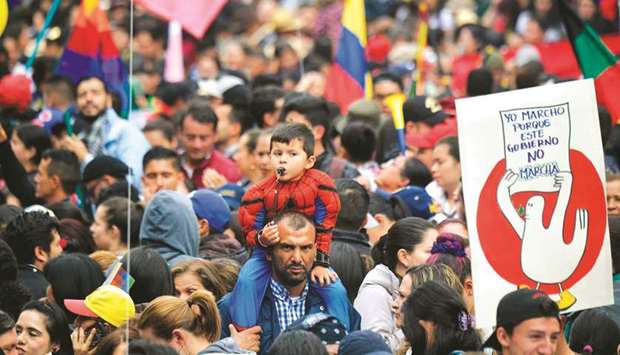Thousands of Colombians took to the streets yesterday to demonstrate against liberal economic policies and armed conflict, amid fears from the government that the country could join the violent protest wave sweeping other Latin American countries.
The nationwide marches and general strike had been called by trade unions and groups representing students, farmers, women, indigenous people and people of African descent.
The demonstrations prevented bus transport in parts of Bogota.
Road blocks, burning barricades and acts of vandalism were reported in some cities.
President Ivan Duque’s conservative government fears that Colombia could see violence similar to that in Bolivia, Chile and Ecuador, where dozens of people were killed in recent protests.
On Wednesday evening, Duque addressed the nation to appeal for peace. The government has imposed heavy security measures, including the closure of Colombia’s borders and granting permission to governors and mayors to declare curfews in their areas.
Large numbers of soldiers have been deployed in Bogota.
The demonstrations oppose alleged government plans to raise the pension age and to lower young people’s minimum wage, though Duque has denied having such intentions.
Protesters are also demanding more funding for universities, the full implementation of the 2016 peace deal with the guerrilla group Farc and stronger action to protect its former fighters and community leaders, hundreds of whom have been killed by armed groups over the past few years.
“There is a lot of anger in this country,” said musician Miguel Guerra, 31.
“The government has turned its back on the peace process,” Guerra told DPA before joining the protest in Bogota.
“I also don’t agree with the economic system, with only the big companies getting support from the government.”
“This country is breaking into pieces,” said Clara Ines Guerrero, 68, who later joined the protestors.
The historian saw the demonstrations in Colombia as being related to those in other Latin American countries in that “the neoliberal system is beginning to show cracks.”
The system based on the defence of “big capital” has eroded workers’ rights and human rights and is facing “a crisis that is now coming to a head in many places,” Guerrero added.
Some people said they were afraid to attend the protests for fear of violence.
“I don’t like this government, which does not defend the poor, but I don’t dare go to the rally,” said Jessica, a 21-year-old student.
Duque has accused leftist Venezuela of planning to send agitators to the protests.
Influential Senator Alvaro Uribe, who is regarded as the president’s mentor, said the Foro de Sao Paulo group of leftist parties and organisations was instigating such rallies to “destabilise democracies” in Latin America.
Some regions or municipalities prohibited alcoholic drinks and carrying firearms for fear of violence, broadcaster Caracol reported.
Schools and universities were closed in some places.
The security measures have prompted accusations that the government was trying to intimidate people into not joining the protests by creating an atmosphere of fear.
Duque’s critics say his apparent reluctance to implement key aspects of the 2016 peace deal, such as reintegrating former Farc fighters into society and developing rural areas, has led to some of the ex-rebels taking up arms again.
Dissidents of the group were already active in the countryside, where they vie for influence with the other rebel organisation National Liberation Army (ELN), paramilitary and criminal groups.
Opinion polls show that Duque’s approval ratings have plunged to less than 30% since he took office in August 2018.

People demonstrate in Bogota yesterday during a nationwide strike called by students, unions and indigenous groups to protest against the government of Colombia’s President Ivan Duque.
